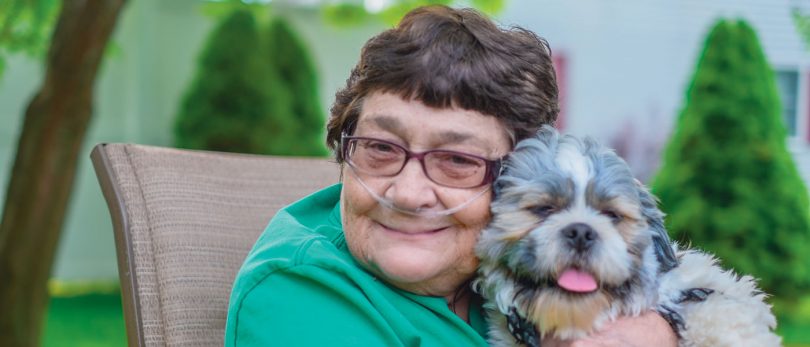Five years ago, Lorraine Rowe’s life was on hold. Severe back pain kept the 64-year-old Sidney resident from everyday activities. She couldn’t do housework or attend her grandchildren’s baseball games. Planning a vacation was out of the question. “I couldn’t stand or sleep comfortably; I couldn’t do anything,” she says.
But she’s since gotten her life back. She credits the specialists at UHS Pain Management for finding ways to control the pain despite her complicated health history. “At UHS, they don’t give up on me,” she says.
Now she’s cheering on her grandchildren from the bleachers and planning a trip to Nashville to celebrate 25 years of marriage to her husband, Michael.
More relief, less medication
Ms. Rowe suffers from a degenerative disease of the spine. The condition causes neck pain and severe sciatica — pain that travels down the legs. She also has a pulmonary condition that requires her to use supplemental oxygen and she is not a candidate for spine surgery.
Despite these complications, she is determined not to rely on opioid (narcotic) painkillers, so she appreciates that UHS Pain Management doctors look for alternative pain solutions. “I don’t want to be on pain medication unless there is no other option,” she says.
UHS Pain Management Clinics, conveniently located in Johnson City, Oxford and Walton, offer multidisciplinary, comprehensive care under the guidance of physician specialists who take advantage of all appropriate avenues for relief, including physical therapy, chiropractic care, specialized procedures, devices, mental health services and much more. Types of pain addressed include headache, as well as back, joint, abdominal and cancer pain.
New pain clinics in Oxford and Walton
UHS has expanded its multidisciplinary Pain Management Program to UHS Chenango Memorial Hospital (at UHS Primary Care—Oxford) and UHS Delaware Valley Hospital in Walton.
“We now offer the same comprehensive pain management services available at UHS Wilson, in your hometown,” says Javaid A. Malik, MD, board-certified anesthesiologist and lead physician for the UHS Outreach Pain Management Team. “We can help find and address the causes of your pain, decrease your discomfort and improve your function compassionately, safely and responsibly. We do this using a variety of modalities, many of which are medication-free.”
Dr. Malik, who has more than 20 years of experience as an interventional pain specialist, is accepting new patients. In addition to UHS Pain Management in Johnson City, he sees patients at:
UHS Primary Care – Oxford
Tuesdays and Thursdays
843-9816
UHS Delaware Valley Hospital
Mondays
865-2400
“Our focus is on finding the cause of the pain and treating the underlying problems — without exposure to opioids whenever possible,” says Matthew Bennett, MD, board-certified orthopedist and director of UHS Pain Management. “If we do use opioids, it’s for the shortest period of time possible and with an exit strategy — a plan to taper the dosage or stop use when appropriate.”
At first, Ms. Rowe benefitted from steroid injections. Under the supervision of Sajid Khan, MD, an expert in physical medicine and rehabilitation, an anti-inflammatory medication was injected directly into her spine’s problem areas, using local anesthesia. Relief lasted up to six months between injections, and gave her some years of relief. However, she built up a tolerance and the injections gradually became less effective. When the pain returned, she sometimes had to take morphine just to function. It was time for the Pain Management Team to switch course.
Spinal cord stimulator
Dr. Bennett, who specializes in orthopedic and spine surgery, is trained and experienced with implanting spinal cord stimulators, small pain-relief devices that are implanted under the skin near the spine using local anesthesia. After consulting with Ms. Rowe’s general practitioner and her pulmonologist, he determined that the device was a safe option for Ms. Rowe.
The stimulator delivers mild electrical pulses directly to the spinal cord, masking pain signals. An external remote allows the user to control the stimulation level as needed. “The new generation of these devices is markedly improved and can work very well,” Dr. Bennett says.
A trial period using an external device verified that it worked for Ms. Rowe, and Dr. Bennett implanted a long-lasting version.
The procedure was a success. Though she had to take it easy for nine weeks of recovery, Ms. Rowe says she now recommends the device to anyone who is a candidate. “It relieves 75 percent of my pain,” she says.
When bothersome symptoms arise, she adjusts the device’s intensity and the problem is gone in about 10 minutes, she says. Other symptoms she treats with ice or warm baths, and she now needs pain medication only on occasion. Once a week, she charges her device while she relaxes.
She can now walk and sit comfortably, allowing her to take on household chores, and enjoy painting, crocheting and her 10 grandchildren. And her “dream vacation” to Nashville is no longer just a dream. “My husband is so happy for me,” she says. “He says I’m like a new woman.”
As a patient who relies on ongoing treatment, Ms. Rowe is particularly happy with the care she receives at UHS. “I’m so glad I switched hospitals,” she says. “They’re awesome.”
Beyond medication
At UHS Pain Management, the goal is to find and address the root causes of pain without exposure to opioid (narcotic) medications when possible. Treatments may include one or a number of the following:
- Physical modalities such as physical therapy, chiropractic care, massage and aqua therapies, home exercise, orthotics or braces, nerve stimulation, heat and cold therapy
- Psychological modalities that have been shown to help patients manage conditions that can contribute to pain, such as depression, anxiety and PTSD. This can include deep relaxation, meditation and cognitive behavioral therapy.
- Procedures and devices such as steroid injections, radiofrequency ablation, spinal cord stimulators, pain pumps and specialized surgery
- Lifestyle coaching, such as nutrition and exercise counseling
- Non-opioid pain medications
Opioid pain medications may be used within current federal and state guidelines.
WE CAN HELP
To make an appointment with a pain specialist in Johnson City, call 748-7468.







